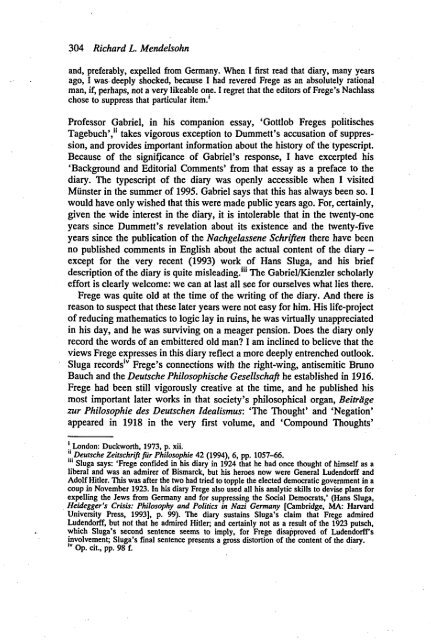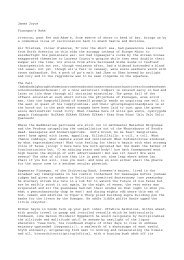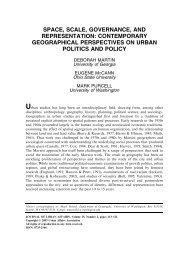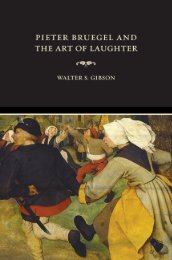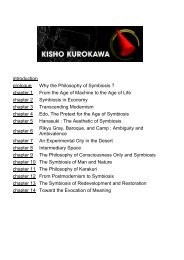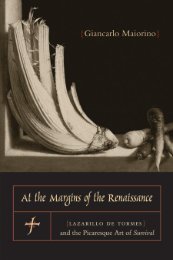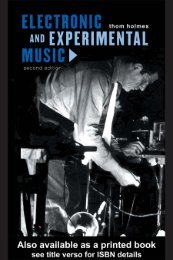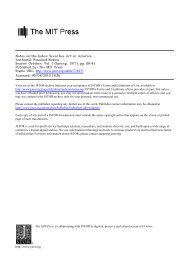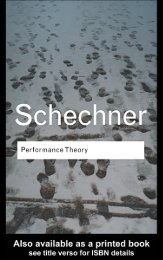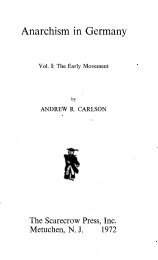Diary: Written by professor Dr Gottlob Frege in the ... - AAAARG.ORG
Diary: Written by professor Dr Gottlob Frege in the ... - AAAARG.ORG
Diary: Written by professor Dr Gottlob Frege in the ... - AAAARG.ORG
You also want an ePaper? Increase the reach of your titles
YUMPU automatically turns print PDFs into web optimized ePapers that Google loves.
304 Richard L. Mendelsohn<br />
and, preferably, expelled from Germany. When I first read that diary, many years<br />
ago, I was- deeply shocked, because I had revered <strong>Frege</strong> as an absolutely rational<br />
man, if, perhaps, not a very likeable one. I regret that <strong>the</strong> editors of <strong>Frege</strong>'s Nachlass<br />
chose to suppress that particular item.'<br />
Professor Gabriel, <strong>in</strong> his companion essay, '<strong>Gottlob</strong> <strong>Frege</strong>s politisches<br />
Tagebuch'," takes vigorous exception to Dummett's accusation of suppression,<br />
and provides important <strong>in</strong>formation about <strong>the</strong> history of <strong>the</strong> typescript.<br />
Because of <strong>the</strong> significance of Gabriel's response, I have excerpted his<br />
'Background and Editorial Comments' from that essay as a preface to <strong>the</strong><br />
diary. The typescript of <strong>the</strong> diary was openly accessible when I visited<br />
Mi<strong>in</strong>ster <strong>in</strong> <strong>the</strong> summer of 1995. Gabriel says that this has always been so. I<br />
would have only wished that this were made public years ago. For, certa<strong>in</strong>ly,<br />
given <strong>the</strong> wide <strong>in</strong>terest <strong>in</strong> <strong>the</strong> diary, it is <strong>in</strong>tolerable that <strong>in</strong> <strong>the</strong> twenty-one<br />
years s<strong>in</strong>ce Dummett's revelation about its existence and <strong>the</strong> twenty-five<br />
years s<strong>in</strong>ce <strong>the</strong> publication of <strong>the</strong> Nachgelassene Schriften <strong>the</strong>re have been<br />
no published comments <strong>in</strong> English about <strong>the</strong> actual content of <strong>the</strong> diary -<br />
except for <strong>the</strong> very recent (1993) work of Hans Sluga, and his brief<br />
description of <strong>the</strong> diary is quite mislead<strong>in</strong>g." 1 The Gabriel/Kienzler scholarly<br />
effort is clearly welcome: we can at last all see for ourselves what lies <strong>the</strong>re.<br />
<strong>Frege</strong> was quite old at <strong>the</strong> time of <strong>the</strong> writ<strong>in</strong>g of <strong>the</strong> diary. And <strong>the</strong>re is<br />
reason to suspect that <strong>the</strong>se later years were not easy for him. His life-project<br />
of reduc<strong>in</strong>g ma<strong>the</strong>matics to logic lay <strong>in</strong> ru<strong>in</strong>s, he was virtually unappreciated<br />
<strong>in</strong> his day, and he was surviv<strong>in</strong>g on a meager pension. Does <strong>the</strong> diary only<br />
record <strong>the</strong> words of an embittered old man? I am <strong>in</strong>cl<strong>in</strong>ed to believe that <strong>the</strong><br />
views <strong>Frege</strong> expresses <strong>in</strong> this diary reflect a more deeply entrenched outlook.<br />
Sluga records' v <strong>Frege</strong>'s connections with <strong>the</strong> right-w<strong>in</strong>g, antisemitic Bruno<br />
Bauch and <strong>the</strong> Deutsche Philosophische Gesellschaft he established <strong>in</strong> 1916.<br />
<strong>Frege</strong> had been still vigorously creative at <strong>the</strong> time, and he published his<br />
most important later works <strong>in</strong> that society's philosophical organ, Beitrage<br />
zur Philosophic des Deutschen Idealismus: 'The Thought' and 'Negation'<br />
appeared <strong>in</strong> 1918 <strong>in</strong> <strong>the</strong> very first volume, and 'Compound Thoughts'<br />
1 London: Duckworth, 1973, p. xii.<br />
ii Deutsche Zeitschrift für Philosophie 42 (1994), 6, pp. 1057-66.<br />
iii Sluga says: '<strong>Frege</strong> confided <strong>in</strong> his diary <strong>in</strong> 1924 that he had once thought of himself as a<br />
liberal and was an admirer of Bismarck, but his heroes now were General Ludendorff and<br />
Adolf Hitler. This was after <strong>the</strong> two had tried to topple <strong>the</strong> elected democratic government <strong>in</strong> a<br />
coup <strong>in</strong> November 1923. In his diary <strong>Frege</strong> also used all his analytic skills to devise plans for<br />
expell<strong>in</strong>g <strong>the</strong> Jews from Germany and for suppress<strong>in</strong>g <strong>the</strong> Social Democrats,' (Hans Sluga,<br />
Heidegger's Crisis: Philosophy and Politics <strong>in</strong> Nazi Germany [Cambridge, MA: Harvard<br />
University Press, 1993], p. 99). The diary susta<strong>in</strong>s Sluga's claim that <strong>Frege</strong> admired<br />
Ludendorff, but not that he admired Hitler; and certa<strong>in</strong>ly not as a result of <strong>the</strong> 1923 putsch,<br />
which Sluga's second sentence seems to imply, for <strong>Frege</strong> disapproved of Ludendorff s<br />
<strong>in</strong>volvement; Sluga's f<strong>in</strong>al sentence presents a gross distortion of <strong>the</strong> content of <strong>the</strong> diary.<br />
iv Op. cit., pp. 98 f.


